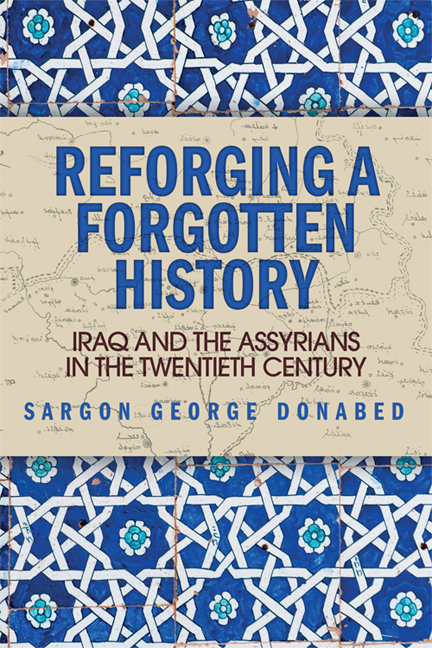Book contents
- Frontmatter
- Contents
- List of Figures
- List of Tables
- Abbreviations
- Acknowledgements
- Dedication
- Map
- Introduction
- 1 Integrating the Assyrian Question
- 2 Framing the Assyrian Narrative: Late Nineteenth and Early Twentieth Century
- 3 Iraq: Building a ‘Nation’-State
- 4 The Birth of the Republic and an Autonomist Struggle
- 5 Enduring Discord: Political Machinations and Border Clearings
- 6 New Movements and War on the Horizon
- 7 State Formation, State-building and Contentious Pluralism
- 8 Conclusion
- Glossary
- Appendix A Village Data
- Appendix B Documents Concerning Cultural and Political Organisations
- Bibliography
- Index
Introduction
Published online by Cambridge University Press: 05 September 2016
- Frontmatter
- Contents
- List of Figures
- List of Tables
- Abbreviations
- Acknowledgements
- Dedication
- Map
- Introduction
- 1 Integrating the Assyrian Question
- 2 Framing the Assyrian Narrative: Late Nineteenth and Early Twentieth Century
- 3 Iraq: Building a ‘Nation’-State
- 4 The Birth of the Republic and an Autonomist Struggle
- 5 Enduring Discord: Political Machinations and Border Clearings
- 6 New Movements and War on the Horizon
- 7 State Formation, State-building and Contentious Pluralism
- 8 Conclusion
- Glossary
- Appendix A Village Data
- Appendix B Documents Concerning Cultural and Political Organisations
- Bibliography
- Index
Summary
Inspired by the suffering of Iraq's martyrs – Sunni and Shiite, Arab, Kurd, and Turkomen, and the remaining brethren in all communities – inspired by the injustice against the holy cities in the popular uprising and against the marshes and other places; recalling the agonies of the national oppression in the massacres of Halabja, Barzan, Anfal and against the Faili Kurds; inspired by the tragedies of the Turkomen in Bashir and the suffering of the people of the western region …
Constitution of Iraq (2005)Half of writing history is hiding the truth.
Captain Malcolm Reynolds, Serenity (2005)An unnamed song is like an unnamed child, it has no identity.
Robyn Hitchcock, musicianRecent events in Iraq, especially those which surfaced between January and March of 2014 calling for an autonomous or independent state in the Nineveh province of the country, have brought the minority issue and the Assyrians closer to the spotlight. In theory, the province could become a bastion for the ethnic and religious minorities who have become the last living link to ancient Mesopotamia in a period where their numbers have drastically decreased due to displacement, war, immigration, economic hardship, and ethno-religious and political discrimination. Demographic change would speak to that reality as the overall population of Christians, the overwhelming majority of whom are of Assyrian descent, decreased from 1.4 million in 1987 to approximately 750,000, or 3 per cent of the Iraqi population, by 2005, according to the United States Department of State. In the 1980s they made up roughly 30 per cent of the population of the northern regions of Iraq and there were approximately 700,000 more living in diaspora. Between 2005 and 2014 many continued to find themselves part of a disproportionate number of internally displaced persons with little hope of an end to their plight.
On 10 June 2014 the group known originally as the Islamic State of Iraq and the Levant/Syria (ISIL/ISIS) and later simply as IS, began to take control of Mosul, marking Christian houses with the Arabic letter N for Nazarene/Christian. Those who could not pay the Islamic tax or jizya were forced to convert or flee.
- Type
- Chapter
- Information
- Reforging a Forgotten HistoryIraq and the Assyrians in the Twentieth Century, pp. 1 - 26Publisher: Edinburgh University PressPrint publication year: 2015



